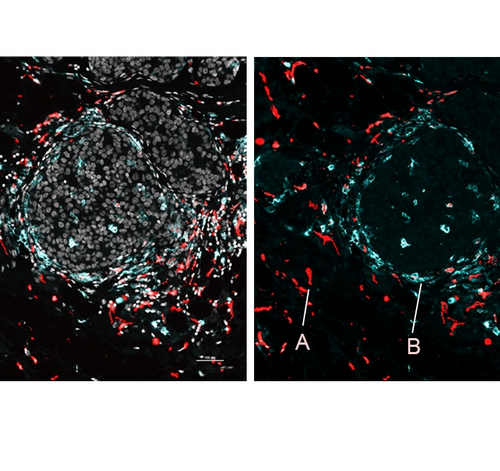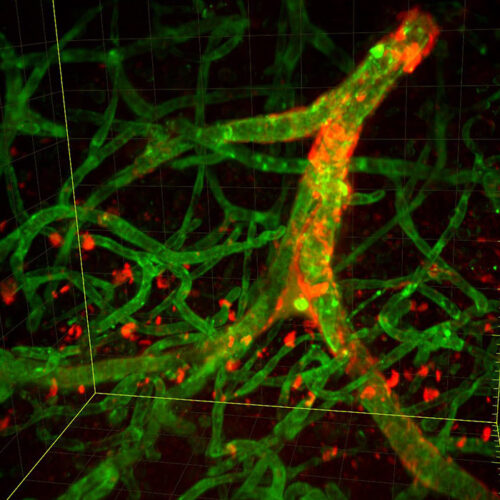Reviewed by Emily Henderson, B.Sc. Jan 1 2023 KAIST’s neuroscientist and professor, Dr. Daesoo Kim attended the “Conference for Musicians with Dystonia” supported by the World Health Organization (WHO) and the Carnegie Hall concert of legendary pianist João Carlos Martins, who is also a dystonia patient, to announce his team’s recent advancements toward finding a...
Duping antibodies with a decoy, researchers aim to prevent rejection of transplanted cells
UNIVERSITY OF CALIFORNIA – SAN FRANCISCO Duping Antibodies with a Decoy, Researchers Aim to Prevent Rejection of Transplanted Cells New Approach May Overcome Persistent Obstacles to Cell Transplantation and Immunotherapy Researchers at UCSF have developed a novel, potentially life-saving approach that may prevent antibodies from triggering immune rejection of engineered therapeutic and transplant cells. Rejection mediated by antibodies—as opposed...
New method precisely locates gene activity and proteins across tissues
WEILL CORNELL MEDICINE IMAGE: IMAGE OF HUMAN BREAST CANCER CELLS SHOWING A) IMMUNOSUPPRESSIVE MACROPHAGES NEAR TUMOR CONNECTIVE TISSUE, AND B) IMMUNOSTIMULATORY MACROPHAGES NEAR TUMOR NESTS. CREDIT: NIR BEN CHETRIT. A new method can illuminate the identities and activities of cells throughout an organ or a tumor at unprecedented resolution, according to a study co-led by researchers at...
Self-assembling proteins can store cellular “memories”
MASSACHUSETTS INSTITUTE OF TECHNOLOGY CAMBRIDGE, MA — As cells perform their everyday functions, they turn on a variety of genes and cellular pathways. MIT engineers have now coaxed cells to inscribe the history of these events in a long protein chain that can be imaged using a light microscope. Cells programmed to produce these chains...
New Research: Intermittent Fasting Might Not Be As Safe as We Thought
By UNIVERSITY OF TORONTO JANUARY 1, 2023 Intermittent fasting is a popular dietary trend that involves cycling between periods of eating and fasting. It is believed to have various health benefits such as weight loss, improved insulin sensitivity, and reduced inflammation. The popular dietary trend has been linked to dangerous eating disorder attitudes and behaviors among adolescents...
A Single Hormone in Men May Predict Their Future Health
02 January 2023 By DAVID NIELD (Fizkes/iStock/Getty Images Plus) A variety of age-related illnesses – including bone weakness, sexual dysfunction, diabetes, cancer, and cardiovascular disease – can be predicted by a single hormone that appears at a steady level in men across the course of their lives, new research reveals. That hormone is INSL3, and it first appears during puberty....
Revised clinical trial form for Alzheimer’s antibody warned of fatal brain bleeds
30 DEC 2022 11:30 AM BY CHARLES PILLER Alzheimer’s patients with cerebral amyloid angiopathy—a condition in which beta amyloid deposits (red) replace the smooth muscle of blood vessels (green)—are particularly vulnerable to brain bleeds when taking lecanemab concurrently with blood thinners. LISSA VENTURA-ANTUNES Earlier this year, the developer of a promising antibody designed to slow...
EXPERT: TIKTOK COULD BE A RISK TO NATIONAL SECURITY
More than 86 million Americans use the social media app TikTok to create, share, and view short videos, featuring everything from cute animals and influencer advice to comedy and dance performances. Concerned experts point out that TikTok’s parent company, the Beijing-based ByteDance, has been accused of working with the Chinese government to censor content and could also...
Heart Health and Dementia: Why Your Blood Pressure and Cholesterol Levels Matter
Written by Marisa Taylor Karas | Reviewed by Mera Goodman, MD, FAAP Updated on December 20, 2022 You may think that your cardiovascular health only refers to your heart. But since your brain and other organs receive blood that’s pumped from your heart, your heart health directly affects your brain health. Vascular dementia is a type...
How COVID can disturb your sleep and dreams—and what could help
by Jakke Tamminen and Rebecca Crowley, The Conversation Credit: Prostock-studio/Shutterstock By the end of 2022, more than 650 million COVID infections had been reported to the World Health Organization. With the true number likely much higher, and the tally increasing by hundreds of thousands every week, the scientific community has been focused on understanding the impact of COVID...





